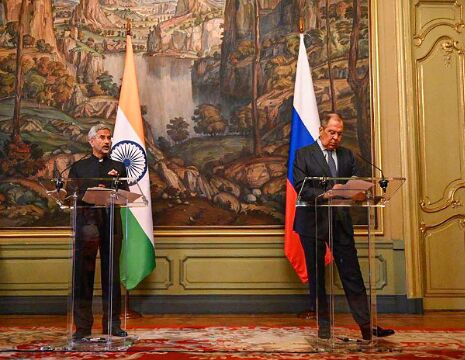Strengthening old ties
The strong bilateral and multilateral engagements between India and Russia could be extended to 2+2 dialogue, and consensus on Indo-Pacific could be achieved

It is time to reaffirm the age-old India-Russia ties as both countries prepare to hold the annual summit later this year. Over the past few months, the foreign ministers, S Jaishankar and Sergey Lavrov, have been reviewing the trajectory of the special and privileged partnership.
Discussions between the two countries during the global health pandemic took precedence as the nature of the virus and its spread continue to trouble the entire world. New Delhi's appreciation for the way Moscow responded with support during the brutal second wave in India in the form of consignments of much required relief and vaccine underscored the strength of this relationship.
The bilateral component of the arrangement, spreading across fields like traditional military supplies, space and nuclear cooperation, is now expanding in another important direction — a 2+2 dialogue of foreign and defence ministers. At present, New Delhi has such an arrangement with the United States, Japan and Australia all of which are members of Quad.
The strong nature of engagement in these fields notwithstanding, both sides have different perceptions on Indo-Pacific and interpretation of the construct. It was time to reiterate to Moscow that, for India, the construct is a multi-polar and inclusive arrangement with ASEAN at its centre. It was at the June 2018 Shangrila Dialogue that Prime Minister Narendra Modi outlined New Delhi's Indo-Pacific vision, and expanded its contours through Indo-Pacific Oceans Initiative later at the East Asia Summit. India prefers a more active participation in the region.
"Changes in the capabilities and interests of major players naturally lead us to reassess the global arena. Whether it is Europe, the Middle-East, Africa, Eurasia, the Arctic or the Indo-Pacific, new developments have redefined our understanding of the landscape, as also of its risks and opportunities. None of us can afford to be in denial of these shifting realities. After all, international relations can never be change-proofed… That is certainly the case with the Indo-Pacific, whose disconnection was an outcome of a certain moment of history…Both our interests and our reach today extend well into the Pacific…our major partners are located there, and indeed, cooperation with the Russian Far East is one notable example. The reality is that there is a vast global common whose safety, security, ecology, environment and activities are increasingly a shared responsibility." EAM Jaishankar noted at an event.
India and Russia strive to maintain the ties built over decades amid an altering geo-political landscape, particularly the emergence of a multi-polar world with which countries are seeking to strike a balance. Besides bilateral and UN-bodies, both countries are today engaged in a number of international fora. New Delhi and Moscow are members of G-20, BRICS, Shanghai Cooperation Organisation and the East Asia Summit, to name a few.
At the UN, Russia, as one of the P5 countries, remains sensitive to India's concerns. Also, as New Delhi prepares to take the presidency of the Security Council during August, it shared its plans and ideas with Moscow. India is currently the Chair of BRICS and the other grouping, Russia-India-China. Earlier this month, Russia updated its National Security Strategy, revising its 2015 document in the backdrop of current developments. Strategic analysts observe that while it contains a list of countries that are not friendly, it also maintains Moscow's view of building upon bilateral relations with China, India and those in the Commonwealth of Independent States. The reiteration also includes multilateral fora like SCO and BRICS.
India joined SCO in 2017 and, in the following year, PM Modi participated in a summit in China. The grouping also includes Pakistan. EAM Jaishankar was attending a meeting of foreign ministers in Tajikistan which is scheduled to hold a summit during September this year.
The sojourn of the EAM, earlier this month, offered an opportunity to focus on regional and global issues including the rapidly evolving situation in Afghanistan which is drawing global attention as Taliban continues its march towards Kabul.
The ground situation in the war-torn country is changing with the Taliban taking an offensive stance. With the United States sticking to its accord with the Taliban to start withdrawing its armed forces from Kabul, countries in the region in particular, and the world in general, are focusing on the next steps. India expressed concern over the level of violence in Afghanistan, underscoring the need for a legitimate government in Kabul.
"The situation in Afghanistan occupied a lot of our attention because it has a direct implication for regional security. We believe that the immediate need of the day is really a reduction in violence and, if we have to see peace within Afghanistan and around Afghanistan, it's important for India and Russia to work together", Jaishankar noted.
As for the government there, it feels that both Russia and China have considerable influence to make the Taliban negotiate for the future of the people in Afghanistan even as the world watches the situation turning turbulent with each passing day.
Views expressed are personal



